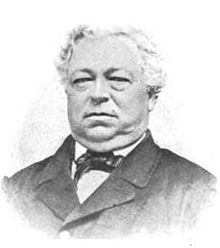Joseph A. Gilmore
Joseph Albree Gilmore (born June 10, 1811 in Weston , Windsor County , Vermont , † April 7, 1867 in Concord , New Hampshire ) was an American politician and governor of the state of New Hampshire from 1863 to 1865 .
Early years and political advancement
Joseph Gilmore attended local schools in his homeland. He then ran a shop in Boston . After moving to Concord, New Hampshire, he opened a general store in 1842. At the same time he was employed by the Concord and Claremont Railway Company. Later he was the manager of this company.
Politically, Gilmore was originally a supporter of the Whig Party and an opponent of slavery . After the fall of the Whigs, he joined the new Republican Party in 1858 . Between 1858 and 1860 he was a member of the New Hampshire Senate . In 1859 he was President of this Chamber; In 1863 he was elected governor of his state as a candidate of his party.
New Hampshire Governor
Joseph Gilmore took up his new office on June 3, 1863 and, after being re-elected in 1864, could remain in office until June 8, 1865. His tenure, like that of his predecessor Nathaniel Berry , was overshadowed by the events of the civil war that ended shortly before the end of Gilmore's term in April 1865. As long as the war lasted, the governor made sure that the soldiers could be paid with the help of loans. He also deployed Bounty Hunters who recruited new soldiers for the army across the state. In this way, he was able to surpass the federal government quota for the state of New Hampshire.
Another résumé
By the time he stepped down from the governor's office, Gilmore's health was in poor health. He then withdrew from politics and died in April 1867. Governor Gilmore was buried in Cambridge . He had eleven children with his wife, Ann Page Whipple.
literature
- Robert Sobel and John Raimo (Eds.): Biographical Directory of the Governors of the United States, 1789–1978. Volume 3, Meckler Books, Westport, 1978. 4 volumes.
Web links
- Joseph Gilmore in the National Governors Association (English)
- Biography of New Hampshire (English)
- Joseph A. Gilmore in the database of Find a Grave (English)
| personal data | |
|---|---|
| SURNAME | Gilmore, Joseph A. |
| ALTERNATIVE NAMES | Gilmore, Joseph Albree |
| BRIEF DESCRIPTION | American politician |
| DATE OF BIRTH | June 10, 1811 |
| PLACE OF BIRTH | Weston , Vermont |
| DATE OF DEATH | April 7, 1867 |
| Place of death | Concord , New Hampshire |

